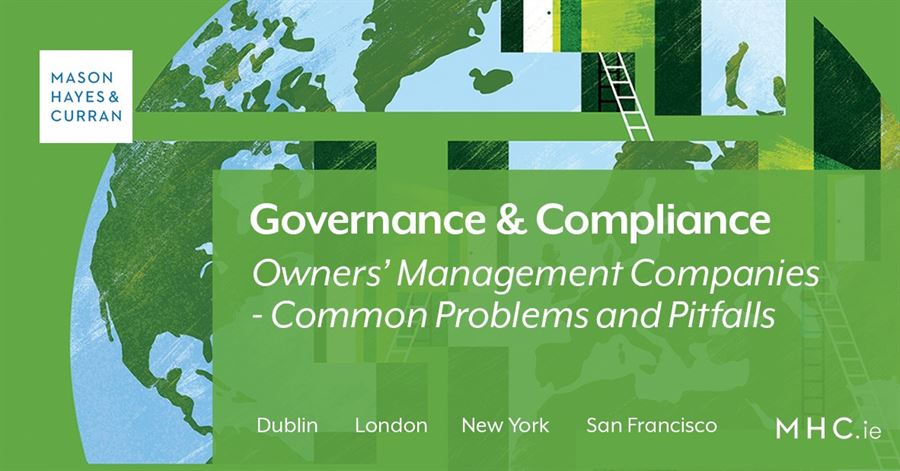Corporate Governance & Compliance: Owners’ Management Companies - Common Problems and Pitfalls

Multi-unit developments in Ireland generally have Owner Management Companies to acquire and manage the common areas of the development. The members of these companies are the owners of units at the development. These companies are known as OMCs..
Where a development has 5 or more residential units, whether or not the development also has commercial units, it and its OMC is governed by the Multi-Unit Developments Act 2011 (MUD Act). OMCs are usually, although not exclusively, incorporated as private companies limited by guarantee, and are therefore also required to comply with the relevant provisions of the Companies Act 2014 (Companies Act).
The MUD Act imposes obligations on an OMC to:
-
the identity of its members
-
the circumstances in which people become and cease to be members of an OMC
-
voting rights of the members
-
information which is required by the OMC to be given to the members and when
We set out below some common issues we have experienced with OMCs and suggest some methods on how to manage them.
Constitution not compliant with the MUD Act 
Many OMCs were incorporated before the MUD Act came into force and their constitutions do not reflect the requirements of that Act. Additionally, many OMCs were incorporated under the slightly different regime before the present Companies Act and have slightly outdated or unwieldy constitutions as a result. This can make their administration difficult.
Alternatively OMCs may be incorporated with a standard CLG constitution which was never tailored for use as an OMC. It can mean that:
-
the subscribing members, who have never been, or who are no longer, unit owners, retain voting rights
-
voting is on a one member, one vote basis, whereas the MUD Act requires that residential unit owners be given a vote for each unit that they own and that votes among commercial units be apportioned on a fair and equitable basis – for instance, proportionate votes based on floor area owned or the contribution to service charge made by the commercial unit owners
-
there is no automatic right for a member to join the OMC on becoming the owner of a unit, or there is the right for the directors to remove a member before the member sells its units
Solution
In these circumstances, a prospective purchaser should request that the seller of the development convene an extraordinary general meeting (EGM) of the members of the OMC to adopt a new, compliant constitution prior to acquisition of the development. If this cannot be done pre-acquisition, analysis of the constitution should be carried out to ascertain how easily an EGM can be convened post purchase, with particular attention being given to notice provisions, quorum, voting rights and who may requisition an EGM if the directors refuse to do so.
The OMC does not have a register of members
All companies, including OMCs, are required to keep registers of their members. Failure to keep a register of members is a criminal offence. The register of members is evidence of the members of a company, unless and until evidence to the contrary is produced.
Solution
The seller of a development should be asked to produce a copy of the register of members. If the registers cannot be located and produced, the seller should be asked to reconstitute them before the sale completes.
The OMC has no sinking fund
All OMCs to which the MUD Act applies are required to levy a sinking fund contribution from its members of €200 per member per year, or any alternative amount the members may agree in a meeting.
The sinking fund is to be used for refurbishment, improvement, maintenance of a non-recurring nature and other “rainy day” type expenditure. An OMC without a sinking fund or with an underfunded sinking fund will not be able to meet any of that type of expenditure that might be needed.
Solution
The OMC’s accounts should be requested and analysed prior to purchase, together with minutes of the meetings of members at which sinking fund contributions were voted on. If there is no sinking fund, or if whatever reserve there is seems to be underfunded, further enquiries should be made.
If the lack of a properly funded sinking fund becomes apparent after acquisition, consideration should be given to proposing a higher levy from the members for the next financial year.
Conclusion
OMCs, while not necessarily a paramount consideration on the acquisition of a development, can nonetheless require a disproportionate amount of time and money to fix post acquisition if they are not fit for purpose. It is important to carry out due diligence on the OMC as part of the acquisition process and, if anything needs to be fixed before purchase ensure that the seller takes the necessary actions.
The content of this article is provided for information purposes only and does not constitute legal or other advice.
Share this:



